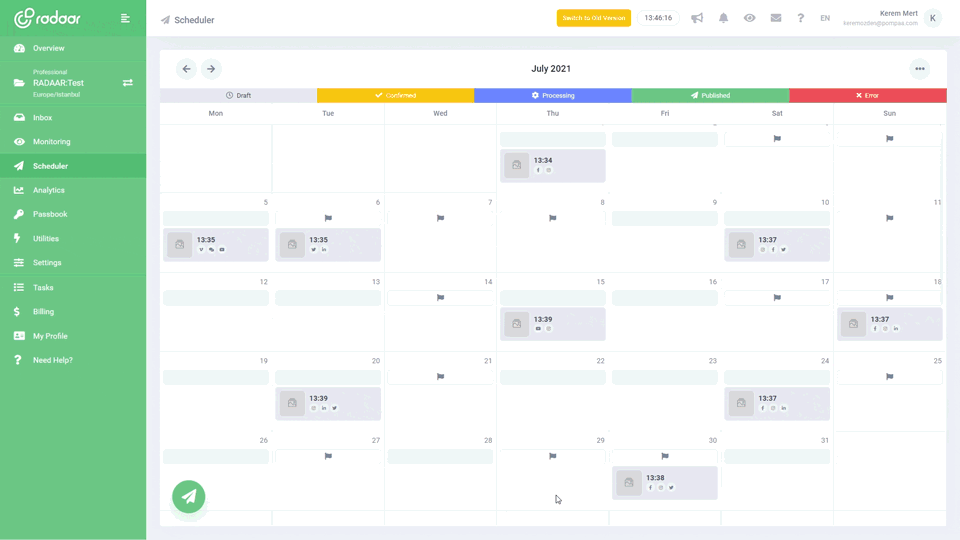Are digital agencies better than in-house teams for your business? Let's find out!
Are you torn between hiring a digital agency or building an in-house team for your business? Dive into our blog to explore the pros and cons of each option and decide which is the best fit for your company!
LEARN MORE LAUNCH DEMO NOW In today's fast-paced digital landscape, businesses of all sizes are grappling with the crucial decision of whether to go with a digital agency or build an in-house team for their marketing needs. This choice can significantly impact your company's growth, efficiency, and overall marketing success. Digital agencies often come with the promise of specialized expertise and a breadth of experience across various industries, whereas in-house teams bring the advantage of deep, brand-specific knowledge and seamless integration within your organization. But which option truly stands out as the better choice for your business?
In this blog post, we're diving deep into the pros and cons of digital agencies versus in-house teams to help you make an informed decision. We'll explore key factors such as cost-effectiveness, flexibility, access to cutting-edge tools, and the ability to scale your marketing efforts. Whether you're a startup looking to make a big splash or an established company aiming to refine your marketing strategy, understanding these distinctions will empower you to choose the best path forward. So, let's embark on this journey to find out which approach can better drive your business towards its goals.
In this blog post, we're diving deep into the pros and cons of digital agencies versus in-house teams to help you make an informed decision. We'll explore key factors such as cost-effectiveness, flexibility, access to cutting-edge tools, and the ability to scale your marketing efforts. Whether you're a startup looking to make a big splash or an established company aiming to refine your marketing strategy, understanding these distinctions will empower you to choose the best path forward. So, let's embark on this journey to find out which approach can better drive your business towards its goals.
Table of Contents
- What are the benefits of digital agencies?
- How does an in-house team compare?
- When should you go for a digital agency?
- What are the drawbacks of in-house teams?
- How do experts view cost implications?
- What about scalability and flexibility issues?
- Which option is more future-proof?
- How to make the right decision?
- Making a strategic choice for your business
What are the benefits of digital agencies?
Digital agencies offer a wealth of benefits for businesses looking to enhance their online presence. They provide specialized expertise and a team of skilled professionals who are always up-to-date with the latest trends and technologies, ensuring your marketing strategies are cutting-edge. Additionally, engaging a digital agency can often be more cost-effective, allowing businesses to access a broad range of services without the overhead costs associated with maintaining an in-house team. Lastly, these agencies bring a fresh perspective to your brand, often uncovering innovative solutions that might be overlooked by internal teams.
How does an in-house team compare?
An in-house team offers a unique advantage by being deeply immersed in your company's culture, values, and goals, which can lead to more cohesive branding and strategic alignment. Having direct access to team members reduces communication barriers, fostering faster decision-making and more dynamic collaboration. However, the breadth of expertise in an in-house team may be limited compared to the diverse skill sets found in digital agencies, potentially necessitating additional training or hiring to cover all bases. Budget-wise, maintaining an in-house team can be more costly due to salaries, benefits, and continuous professional development expenses.
When should you go for a digital agency?
When should you go for a digital agency? Opt for a digital agency when your business needs specialized skills and a fresh perspective that your in-house team might lack. If you require scalable solutions to handle fluctuating workloads, agencies can offer the flexibility you need. Additionally, tapping into the latest tools and industry trends is easier with an agency, helping you stay competitive without the expense of constant training and software acquisition.
What are the drawbacks of in-house teams?
In-house teams can sometimes be a significant drain on a company's resources, as they require long-term investment in salaries, benefits, and ongoing training. Additionally, trying to cover the broad spectrum of digital marketing skills with a limited team can lead to gaps in expertise. This often results in in-house teams being less adaptable to the rapid changes in digital technologies and trends. Lastly, the creative output might become stagnant, as fresh perspectives often come from external sources like digital agencies.
How do experts view cost implications?
Experts often point out that cost implications can vary significantly between digital agencies and in-house teams. While an in-house team can lead to consistent, long-term expenses like salaries, training, and benefits, a digital agency can offer more flexibility with project-based pricing and specialized skills. Many businesses find that agencies are more cost-effective in the short term for specific campaigns or projects due to the reduced overhead. Ultimately, the best choice depends on your company's specific needs, budget, and long-term goals.
What about scalability and flexibility issues?
Scalability and flexibility are crucial factors when considering whether to go with a digital agency or an in-house team. Digital agencies offer extensive scalability, allowing businesses to ramp up or dial down their marketing efforts based on current needs without the hassle of hiring or downsizing staff. Most digital agencies have a wide array of expertise and resources, meaning they can adapt to a variety of projects, large or small, with relative ease. This flexibility ensures that your business can quickly respond to market changes and opportunities without the logistical headaches often associated with managing in-house teams.
On the other hand, an in-house team might struggle with scalability and flexibility due to limited resources and expertise. Expanding an in-house team often involves a lengthy hiring process, training, and integration, which can be both time-consuming and expensive. Additionally, an in-house team may lack the broad skill set that a digital agency can bring to the table, making it difficult to pivot quickly or tackle specialized projects. While an in-house team allows for more direct control and alignment with company culture, it often lacks the nimbleness and breadth of expertise that a digital agency can provide.
On the other hand, an in-house team might struggle with scalability and flexibility due to limited resources and expertise. Expanding an in-house team often involves a lengthy hiring process, training, and integration, which can be both time-consuming and expensive. Additionally, an in-house team may lack the broad skill set that a digital agency can bring to the table, making it difficult to pivot quickly or tackle specialized projects. While an in-house team allows for more direct control and alignment with company culture, it often lacks the nimbleness and breadth of expertise that a digital agency can provide.
Which option is more future-proof?
When considering which option is more future-proof, digital agencies often have an edge due to their agility and access to the latest industry tools and trends. They continuously adapt to changes in the digital landscape, ensuring your strategies remain cutting-edge. On the other hand, in-house teams offer deep brand knowledge and can be tailored to evolving company needs more seamlessly. Ultimately, combining both approaches might provide the most resilience, leveraging the strengths of each for long-term success.
How to make the right decision?
Making the right decision between a digital agency and an in-house team depends on your business goals, budget, and specific needs. Start by evaluating the expertise and resources each option offers; agencies often bring a diverse skill set, while an in-house team provides more dedicated focus. Consider the long-term costs and flexibility—agencies can be cost-effective but might require more collaboration, whereas in-house teams can be more expensive but offer better control. Ultimately, weigh the pros and cons based on what aligns best with your business strategy and growth plans.
Making a strategic choice for your business
In the end, the decision between a digital agency and an in-house team comes down to the unique needs and goals of your business. If you're seeking specialized expertise, scalability, and access to the latest tools and technologies, a digital agency might be the more strategic choice. Agencies bring a breadth of experience from working with a variety of clients and industries, offering fresh perspectives and innovative solutions that can drive your business forward.
On the other hand, if you value having dedicated team members who are deeply embedded in your company culture and can collaborate closely with other departments, an in-house team could be the way to go. In-house teams offer the advantage of quick communication and a profound understanding of your brand's nuances. Ultimately, the best decision aligns with your long-term vision, resources, and the specific challenges and opportunities your business faces. Making an informed, strategic choice will ensure that your digital marketing efforts align perfectly with your overall business objectives.
On the other hand, if you value having dedicated team members who are deeply embedded in your company culture and can collaborate closely with other departments, an in-house team could be the way to go. In-house teams offer the advantage of quick communication and a profound understanding of your brand's nuances. Ultimately, the best decision aligns with your long-term vision, resources, and the specific challenges and opportunities your business faces. Making an informed, strategic choice will ensure that your digital marketing efforts align perfectly with your overall business objectives.
SOCIAL MEDIA SCHEDULER
Plan and publish...
Plan and publish your content for Facebook, Instagram, Twitter, and LinkedIn from one simple dashboard.
LEARN MORE FREQUENTLY ASKED QUESTIONS
What is social media management platform?
RELATED BLOG POSTS
All the tips & tricks you'll need...
Get the fresh tips and tricks you'll need to ace social media marketing.













